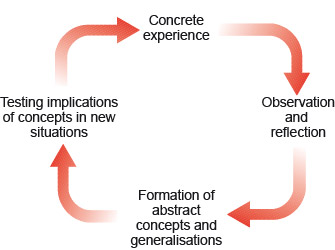Reflection as a process of integration
There are many academic disciplines and sources of knowledge that influence social work practice, and these include sociology, psychology, social policy, law and research. These can be combined with practice experience, the skills of fellow practitioners and the knowledge of service users to make a potent learning experience, without which professional practice might be less informed.
Connecting academic learning with practice requires the ability to draw upon knowledge and use it to think about and write in a ‘reflective way’, and to make sense of practice.
However, reflection requires not only the intellectual application of ideas, but also an understanding of this process of learning through experience and self-awareness. Reflective practice includes an appreciation of, and sensitivity to, your own skills and values, and an awareness of your own impact on others in relationship-based forms of work.
This approach to reflection has been the focus of writers such as Donald Schön (1983) and David Kolb (1985). These theorists have been interested in the ways in which adults learn, and especially in the different ways that professionals learn and develop their practice. Kolb went on to develop a cycle of learning, as illustrated in Figure 8 below.
The cycle of learning begins with the learner having a concrete, or specific, experience in practice, which prompts ‘reflective observations’ within the learner. These observations then lead the learner to draw out ‘generalisations and abstract conceptualisations’, which may then be applied to a similar experience, prompting ‘application of ideas and active experimentation’. Thus, the learner does not respond mechanically, simply by following rules or procedures, but learns by reflecting on practice and modifying or developing it in the process.


